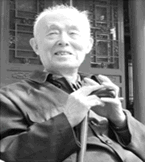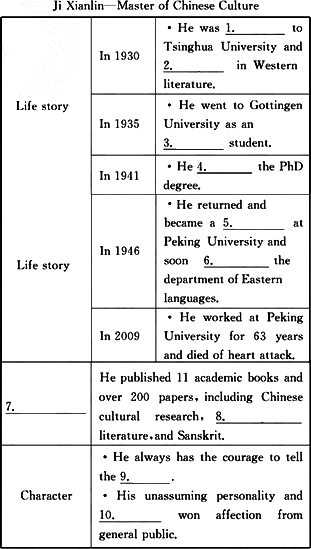
Ji Xianlin, a famous paleographer(古文书学家), historian, and writer, was born in 1911. In 1930, Ji was admitted to Tsinghua University as a major in Western literature. In 1935, he went to Germany as an exchange student to study ancient languages, receiving his PhD degree in 1941.
Ji returned to China in 1946, and in the autumn of the same year, became a professor in Peking University.
Ji Xianlin believes, “Cultural exchange is the main drive for humankind’s progress. Only by learning from each other’s strong points to make up for shortcomings can people constantly progress, the ultimate(最终的)target of which is to achieve a kind of Great Harmony. ” Over the past ten years, Ji has actively participated in discussions on the cultural problems between the East and the West, based on the same ideology. According to him, human culture is divided into four parts: Chinese culture, Indian culture, Arabic-Islamic culture and European-American culture, with the former three making up the Eastern cultural system and the last the Western one.
With his achievements in the history of Sino-Indian cultural relations, Buddhism history, Indian literature, and comparative literature, Ji Xianlin is known as a master of Eastern studies both at home and abroad.
1. What is the main idea of the passage?
A. The brief introduction of Ji Xianlin.
B. Ji Xianlin’s ideology.
C. Ji Xianlin’s achievements.
D. Ji Xianlin’s discussions on the cultural problems between the East and the West.
2. Which of the following statements is TRUE according to the passage?
A. In 1930, Ji was admitted to Tsinghua University as a major in Eastern literature.
B. The ultimate target of cultural exchange is to achieve a kind of Great Harmony.
C. Ji Xianlin is a master of Western studies both at home and abroad.
D. Ji Xianlin received his PhD degree in 1935.
3. What does the underlined word in the second paragraph mean?
A. Decision. B. Measure. C. Support. D. Aim.
4. Which of the following is different from the others according to Ji Xianlin?
A. Chinese culture.
B. Indian culture.
C. Arabic-Islamic culture.
D. European-American culture.
科目:高中英语 来源:高一英语Unit2 Sporting events单元质量评估(译林牛津版必修4) 题型:053
请认真阅读下列短文,并根据所读内容在文章后表格中的空格里填入一个最恰当的单词。注意:每个空格只填1个单词。

Ji Xianlin, honoured by many as the“master of Chinese culture”had died of heart attack when he was 97.Ji repeatedly asked the media to stop calling him a“maestro in traditional Chinese culture”, but despite the protests, the“master”title stuck.“Ji's leaving is the ending of an era,”says Zhao Rengui, professor of Beijing Normal University.“There are fewer and fewer masters accomplished like him nowadays.”
Son to an impoverished rural family in Linqing, Shandong province, Ji was admitted to Tsinghua University in 1930 and majored in Western literature.Five years later he went to Gottingen University in Germany as an exchange student, majoring in Sanskrit and lesser-known ancient languages like Pali.He would spend more than 10 years in Germany and received his PhD in 1941.
In Germany, Ji met Irmgard, his friend's landlord's daughter, who helped him type his dissertation, because he could not afford a typewriter.The two soon fell in love but Ji was already married in China and made the hard decision to give up the relationship and returned to China in 1946.In 1946 he became a professor at Peking University and soon founded the department of Eastern languages in the university and he worked for 63 years.
Ji published 11 academic books and over 200 papers in more than 10 academic fields, including Chinese cultural research, comparative literature, and Sanskrit.Ji maintained that“Cultural exchange is the main drive for humankind's progress.Only by learning from each other's strong points to make up for shortcomings can people constantly progress, the ultimate target of which is to achieve a kind of Great Harmony.”“One thing about Ji that deserves our admiration is that he never fears to tell the truth.He speaks out what he thinks,”says Zhao.
In 1998, Ji published Memoirs from the Cowshed(Niupeng Zayi), a resonating book recording his experience in the“cultural revolution”(1966~1976)and reflection on the turmoil.“I have a strong faith that if the process of such a disaster is truthfully recorded, it will be a mirror for our great nationality”, he once said.“To look at ourselves in the mirror often will be very beneficial.”
Ji won affection from general public also for his unassuming personality and humility.

查看答案和解析>>
科目:高中英语 来源:江西省吉安市2011届高三第二次模拟考试英语试题 题型:016
It was on ________ Saturday in ________ July of 2009 that the famous scholar of Chinese traditional culture, Ji Xianlin, passed away.
/;/
/; the
a; a
a; the
查看答案和解析>>
科目:高中英语 来源:吉林省延边二中2008-2009学年度高三11月阶段测试英语试题 题型:050
| |||||||||||||||||||||||||||||||||||||||||||||||||||||||||||
查看答案和解析>>
科目:高中英语 来源: 题型:
根据下列句子及所给汉语注释,写出空缺处各单词的正确形式。每空只写一词。
The _____________(设计) of the Amber Room was in the style still popular today.
A box of chocolates is a most________(受欢迎) gift for lovers on St Valentine’s Day
A fact is anything that can be ___________(证实).
Ji Xianlin, an outstanding scholar, was ________(熟悉)with 12 foreign languages.
This is a photo taken by a _______________(职业)photographer.
__________(比较) with others, his idea sounds more reasonable.
Some _________(志愿者)offer help to “left behind children” in rural areas educationally.
On ______________(星期三),our teachers often have meetings.
This plant can be found in the __________(南部)parts of the country.
On hearing the funny story, all of us burst out ____________(大笑).
查看答案和解析>>
湖北省互联网违法和不良信息举报平台 | 网上有害信息举报专区 | 电信诈骗举报专区 | 涉历史虚无主义有害信息举报专区 | 涉企侵权举报专区
违法和不良信息举报电话:027-86699610 举报邮箱:58377363@163.com